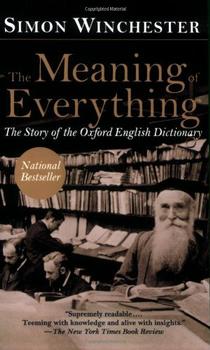Summary | Excerpt | Reviews | Readalikes | Genres & Themes | Author Bio

Critics' Opinion:
Readers' Opinion:
First Published:
Sep 2003, 256 pages
Paperback:
Oct 2004, 286 pages
The vocabulary, though, is much more familiar to our modern ears. A raft of pronouns and prepositions - us, for, to, him, in, he - are there in Old English, to languish unchanged for more than 1,000 further years (not, however, that their meanings were always identical to the sense the words possess today). A number of verbs have the same or a quite similar look and sound: singan for sing, stod for stood, ondswarede for answered. Ingang and utgang are not dissimilar to the Eingang and Ausgang one might see today in Frankfurt railway station.
And in Beowulf a large number of all words in the text are complex combination words, known today as kennings. One such is beadoleoma, which means sword, but which translates literally as a combination that will be well known to fans of Star Wars, 'battle light'. There are in addition some 50 words in Old English which signify the sea - most of these are kennings, and they include handsome and poetic combinations such as hwaelweg (whale-way), drencflod (drowning-flood), and streamgewinn (waters-strife). None survives today, more's the pity. Nor do either waegflota or waeghengest -wave-floater or wave-steed - by which the Old English meant what we today call a ship.
The reign of Old English was to end in the twelfth century; but before it did so, two more linguistic invasions took place, enriching yet further - with words from Latin and from Norse - the steadily swelling vocabulary of the islands.
New Latin words entered the lists between the eleventh and twelfth centuries, largely as a result of the proselytizing work of Christian missionaries (all of them Latin-speaking) who, some long while earlier, had flooded across the British Isles, eager to save souls, They claimed to be bringing 'the Word'; to a remarkable and unforgettable extent, but somewhat at a variance from what they intended, so they did.
Religious words, not. surprisingly, make up a goodly proportion of the list. Although a trinity of key words that attest to the very heart of belief - God, heaven, sin - are actually of Germanic origin, Latin-originated words first recorded either in the eleventh century or some while later - many coming into Middle English through French - and dealing with churchly mechanicals, are there in abundance: abbot, alb, anchorite, angel, antichrist, canticle, chalice, cloister ,font, idol, martyr, pope, priest, prophet, psalm, relic. But God was not all: visitors from the Continent over several centuries brought with them the names of plants, fruits, and trees hitherto entirely unfamiliar to the islands: cedar, cucumber, jig, ginger, laurel, lentil, lovage, radish; and they told of exotic animals quite unknown to the Teutonically-influenced Britons - elephant, leopard, scorpion, tiger. The fact that dirge, marshmallow, periwinkle, and sock also quite probably entered the islands at around this time and probably from the same ultimate source might seem at first blush slightly more perplexing, except that the visitors probably sang in a dull monotone, knew more than a little of the local botany, and wore soft foot-coverings to protect them against the raw English winters--and moreover had names for them all.
New Norse words were introduced in a far less congenial fashion. The Vikings began raiding and pillaging England in the eighth century; the Danes did much the same a century later, first ruling all of north-east England under terms of a treaty to which they submitted the weakling English, then in 991 going further and seizing the English throne, running all England's affairs for the next 25 years. Along With making mayhem in, or a fiefdom out of, England, both sets of northern adventurers introduced into English hundreds of their own words - many that turned out to be of the most profound importance and yet, in terms of their exoticism and interest, among the most prosaic in the tongue.
Copyright Simon Winchester 2003. All rights reserved. No part of this book may be reproduced without written permission from the publisher, Oxford University Press.





The House on Biscayne Bay
by Chanel Cleeton
As death stalks a gothic mansion in Miami, the lives of two women intertwine as the past and present collide.

The Flower Sisters
by Michelle Collins Anderson
From the new Fannie Flagg of the Ozarks, a richly-woven story of family, forgiveness, and reinvention.

The Funeral Cryer by Wenyan Lu
Debut novelist Wenyan Lu brings us this witty yet profound story about one woman's midlife reawakening in contemporary rural China.
Your guide toexceptional books
BookBrowse seeks out and recommends the best in contemporary fiction and nonfiction—books that not only engage and entertain but also deepen our understanding of ourselves and the world around us.